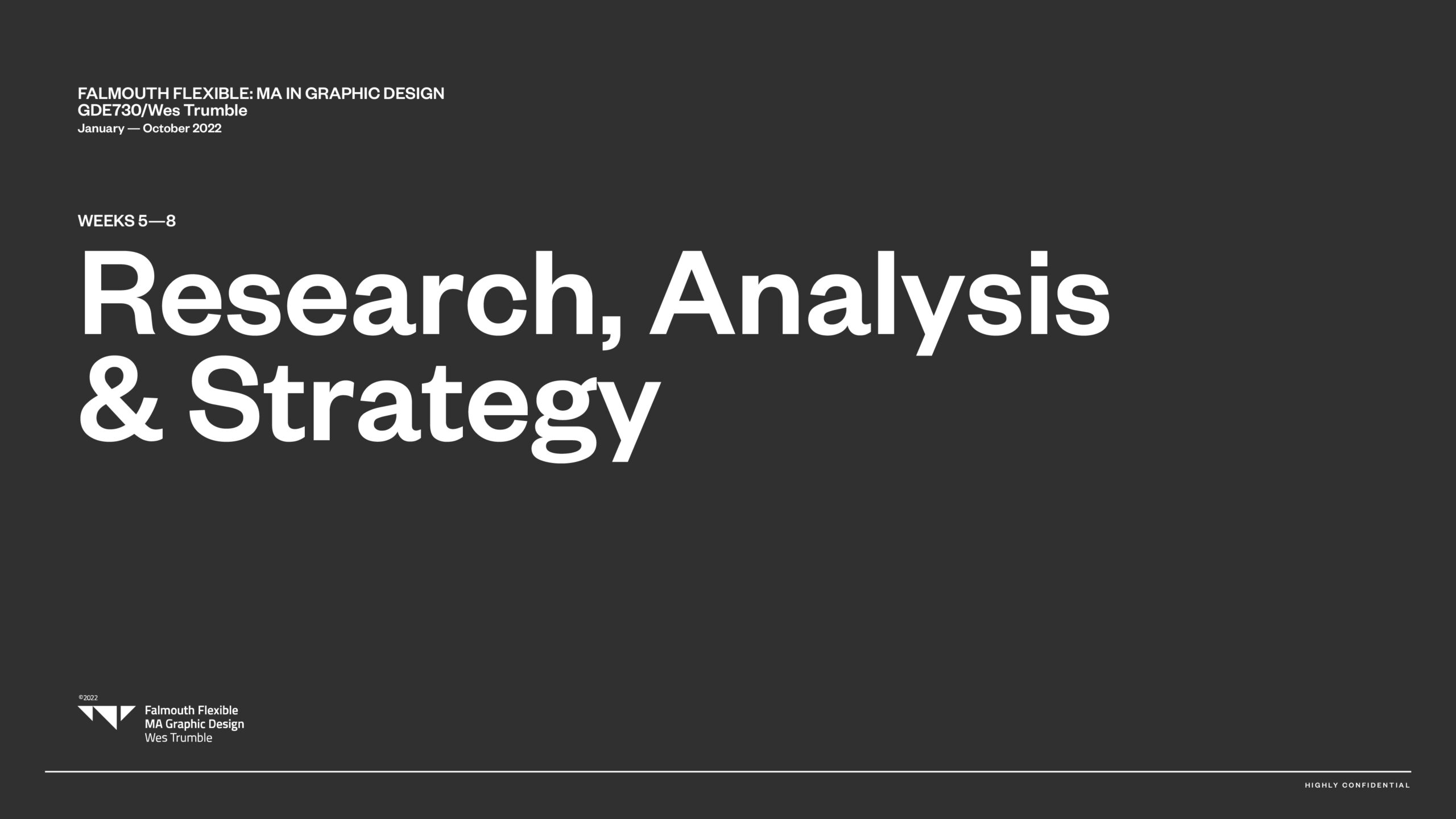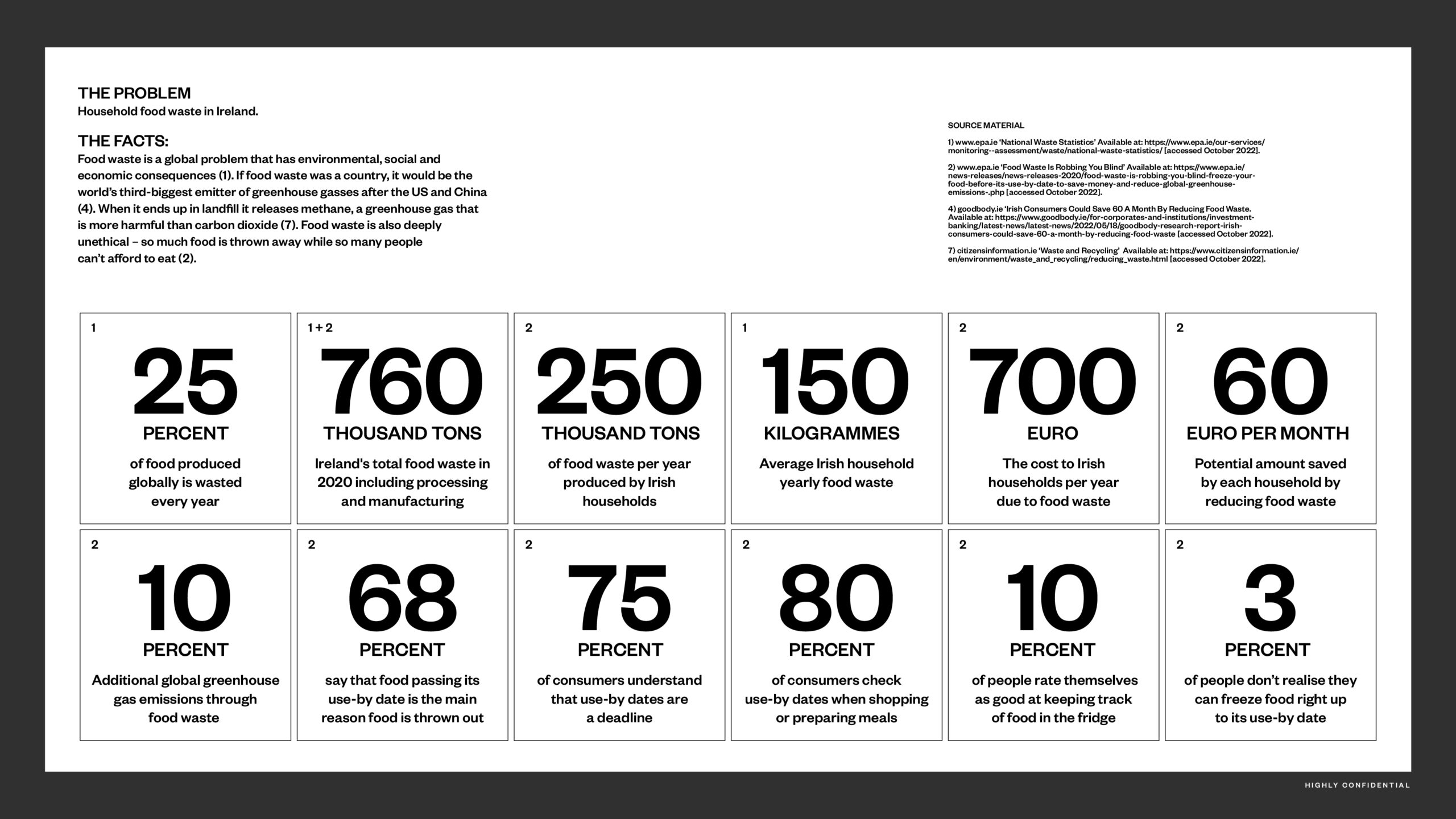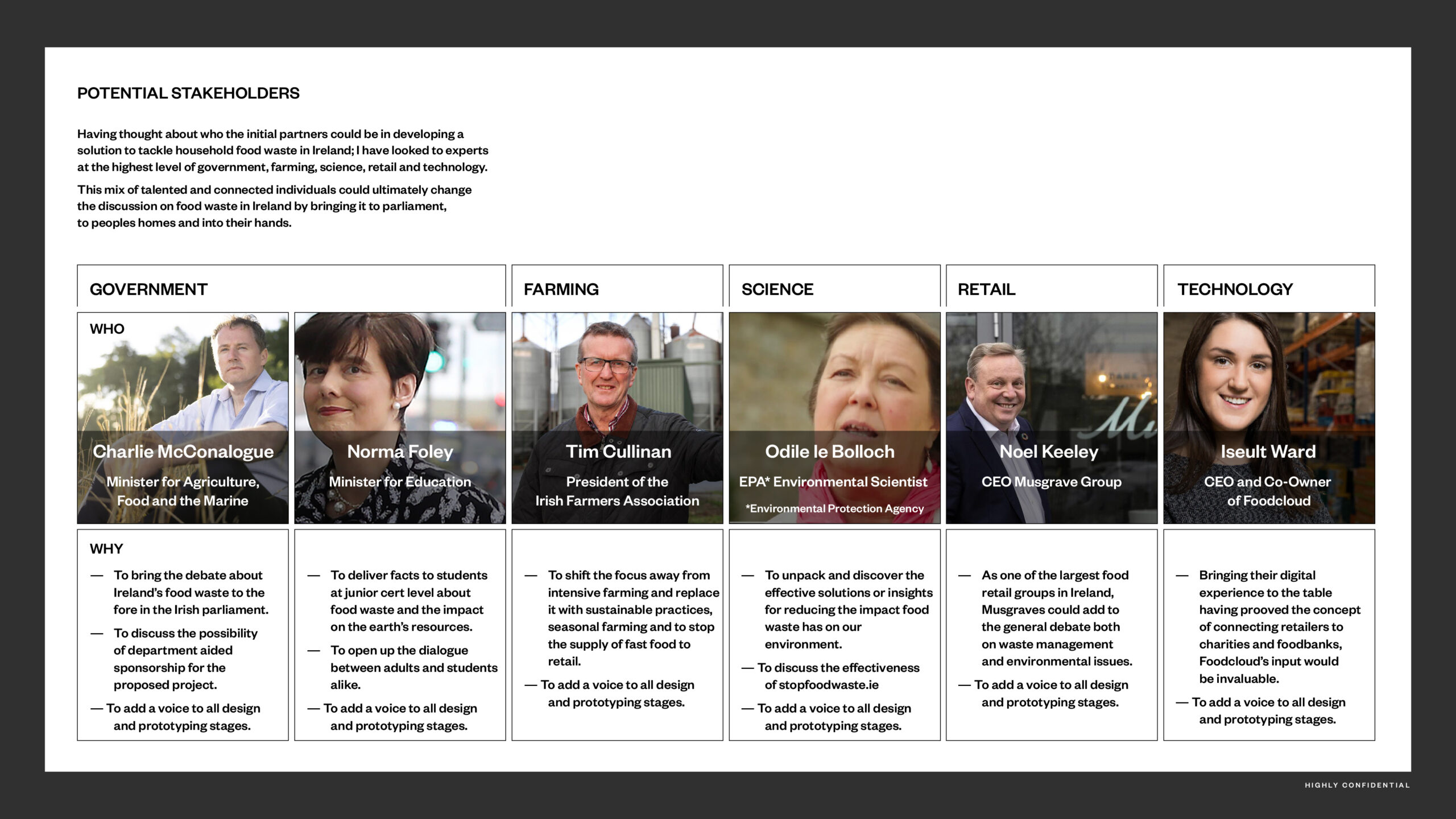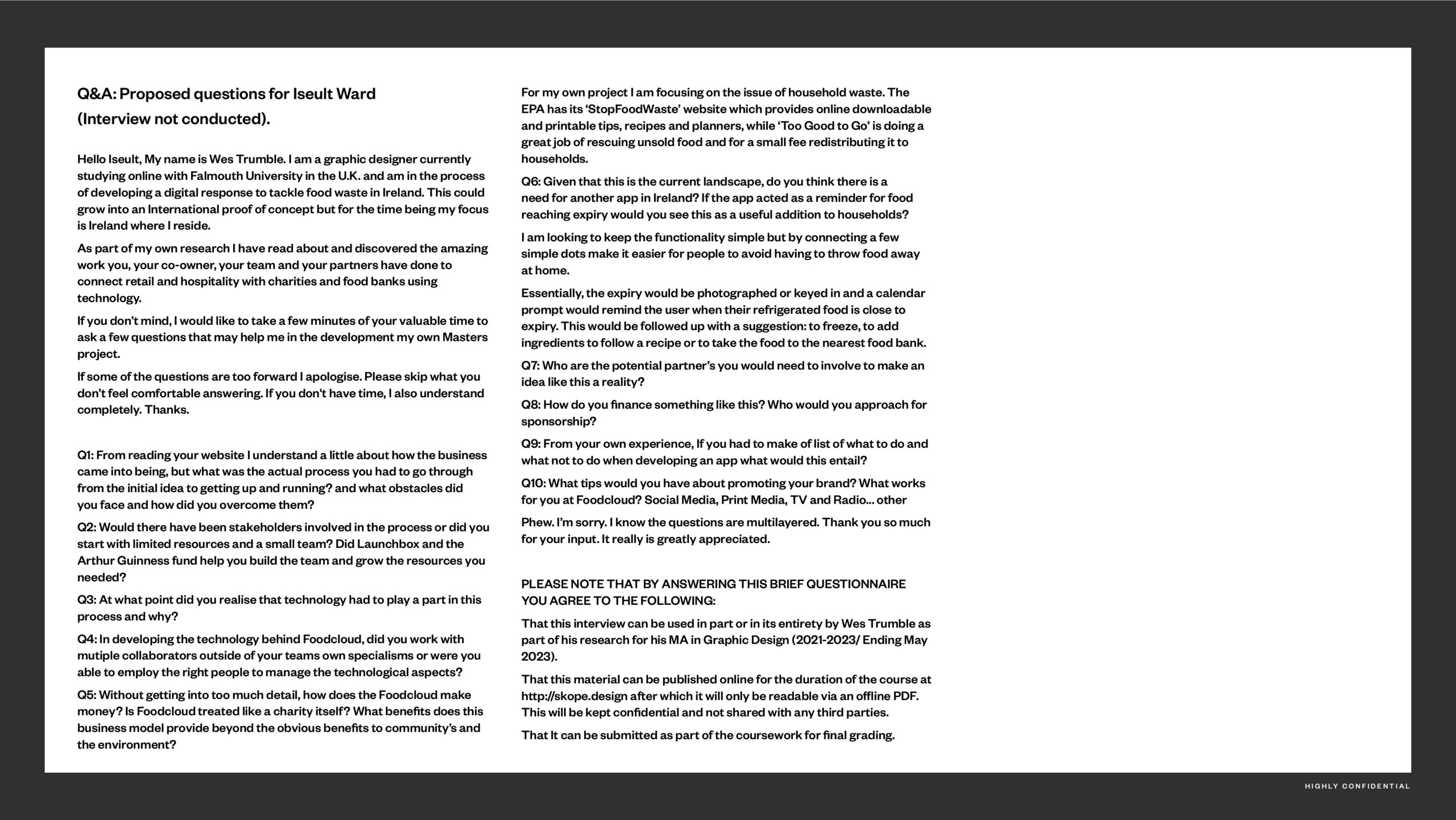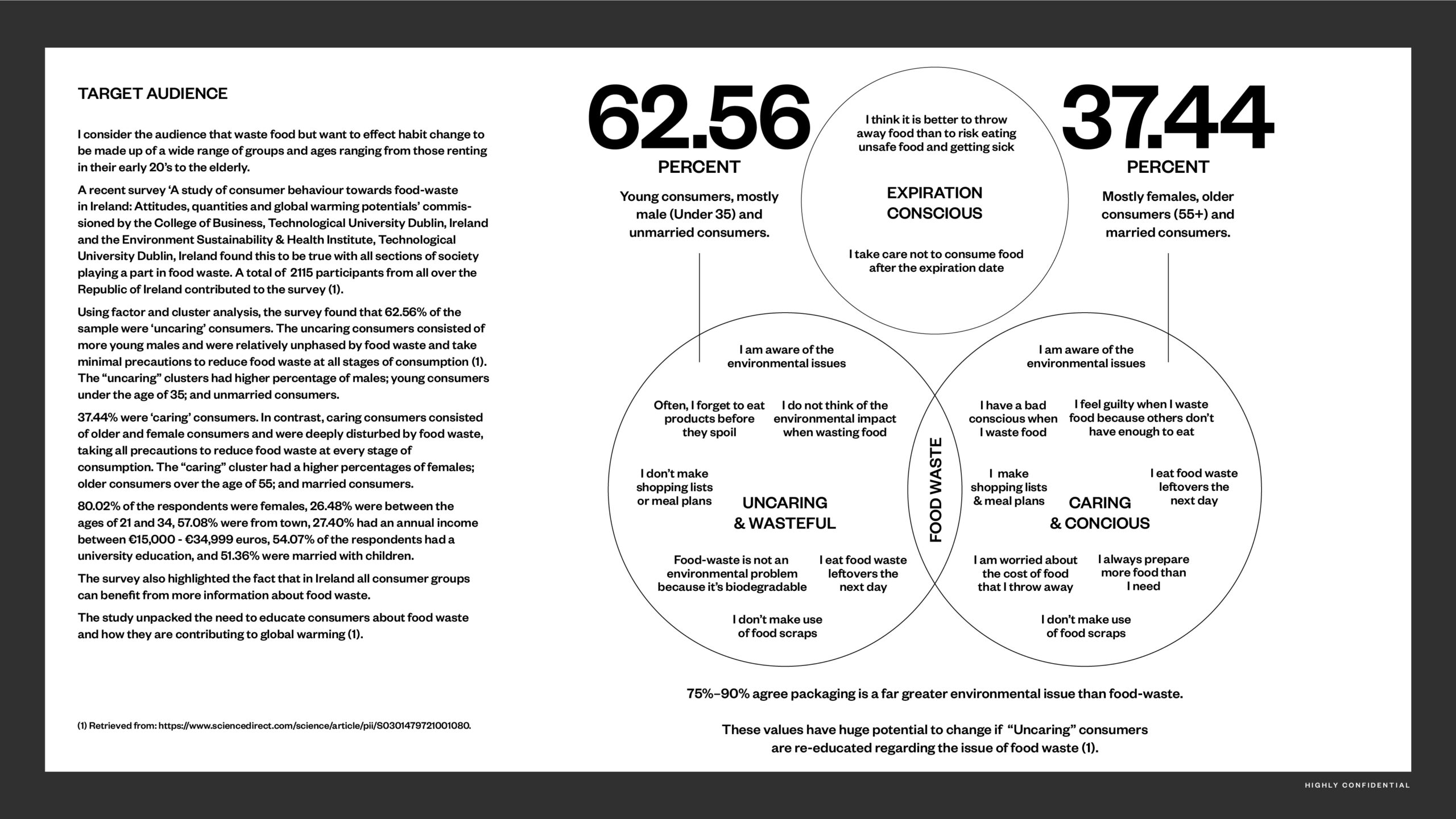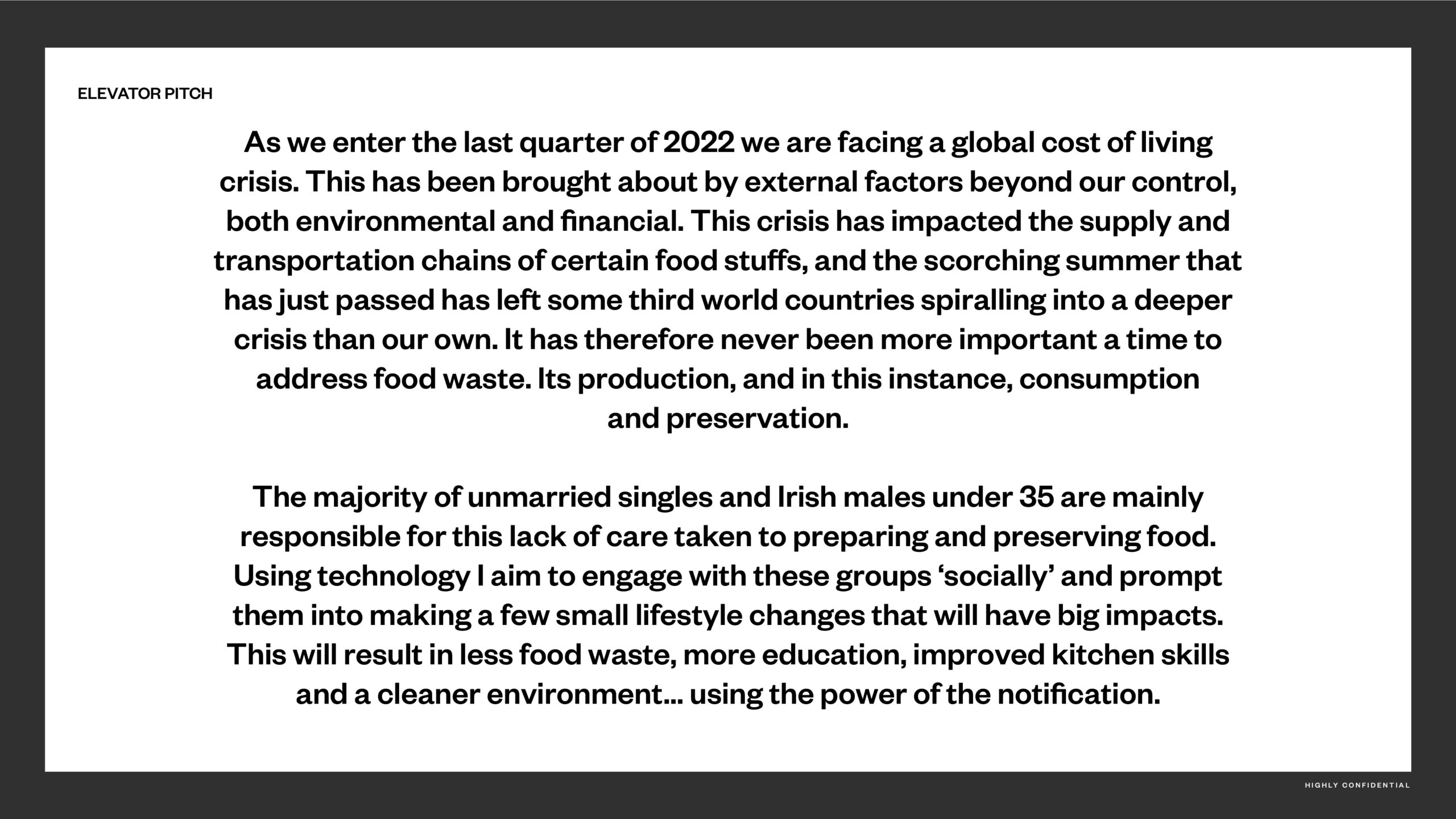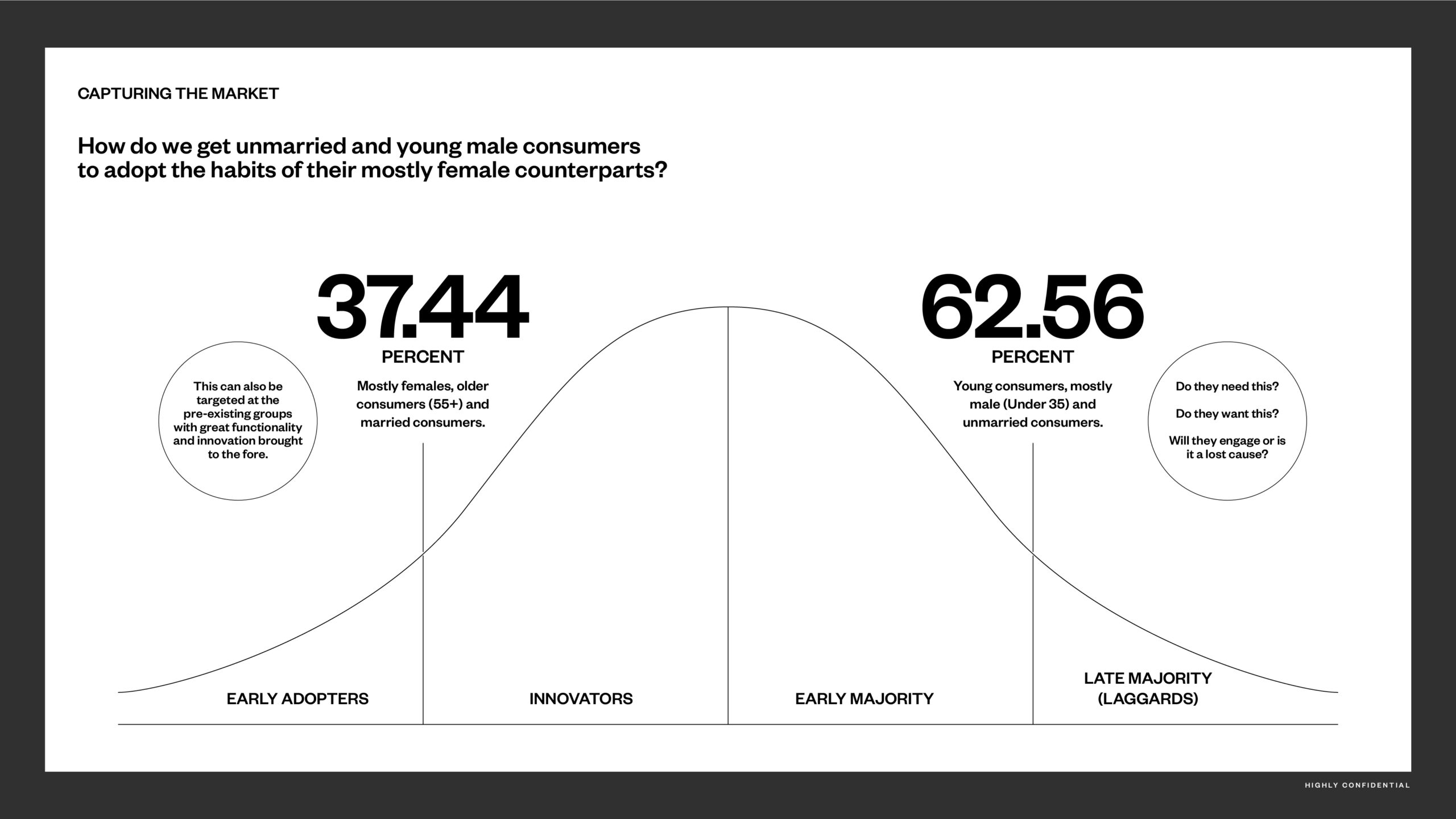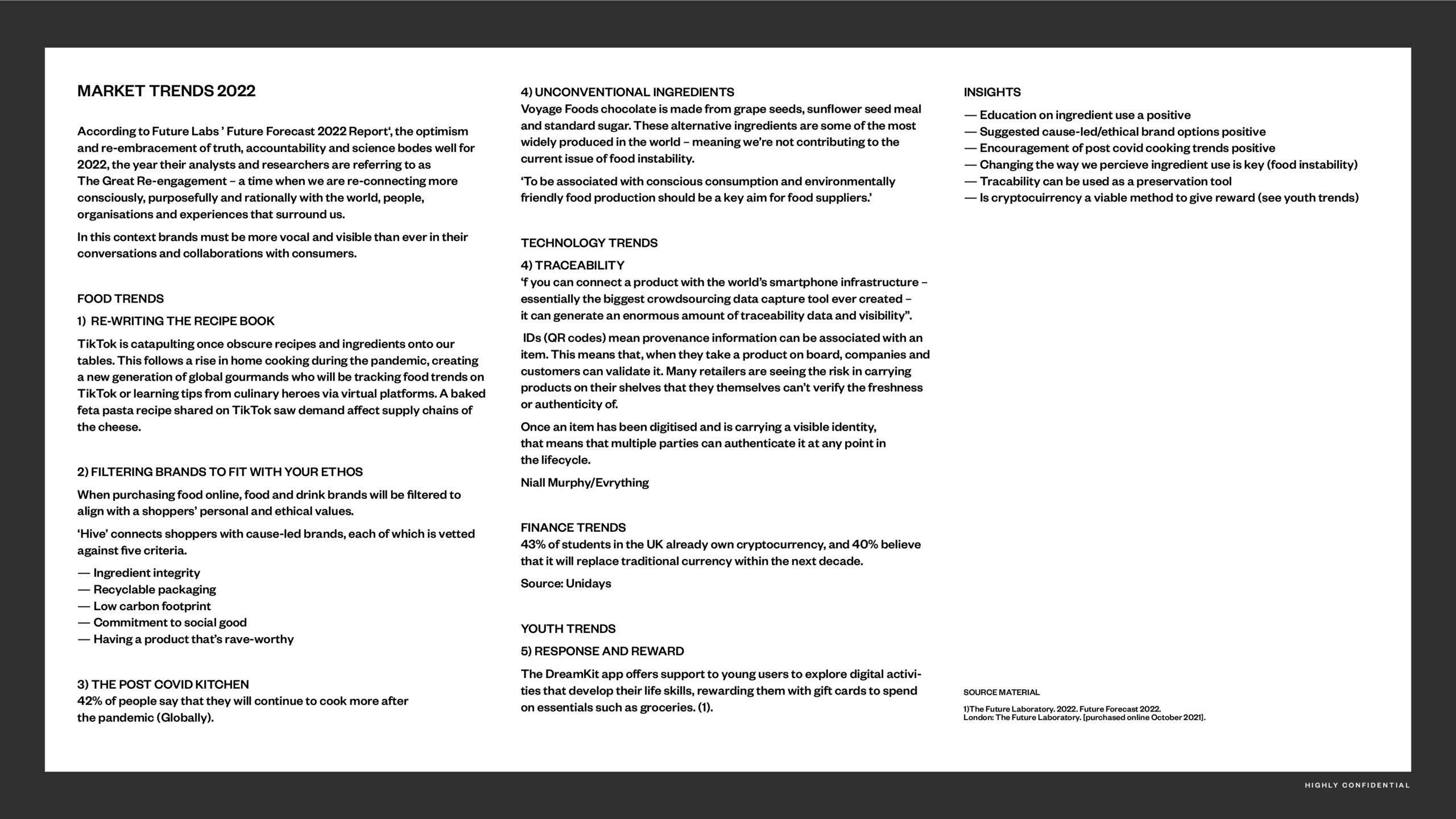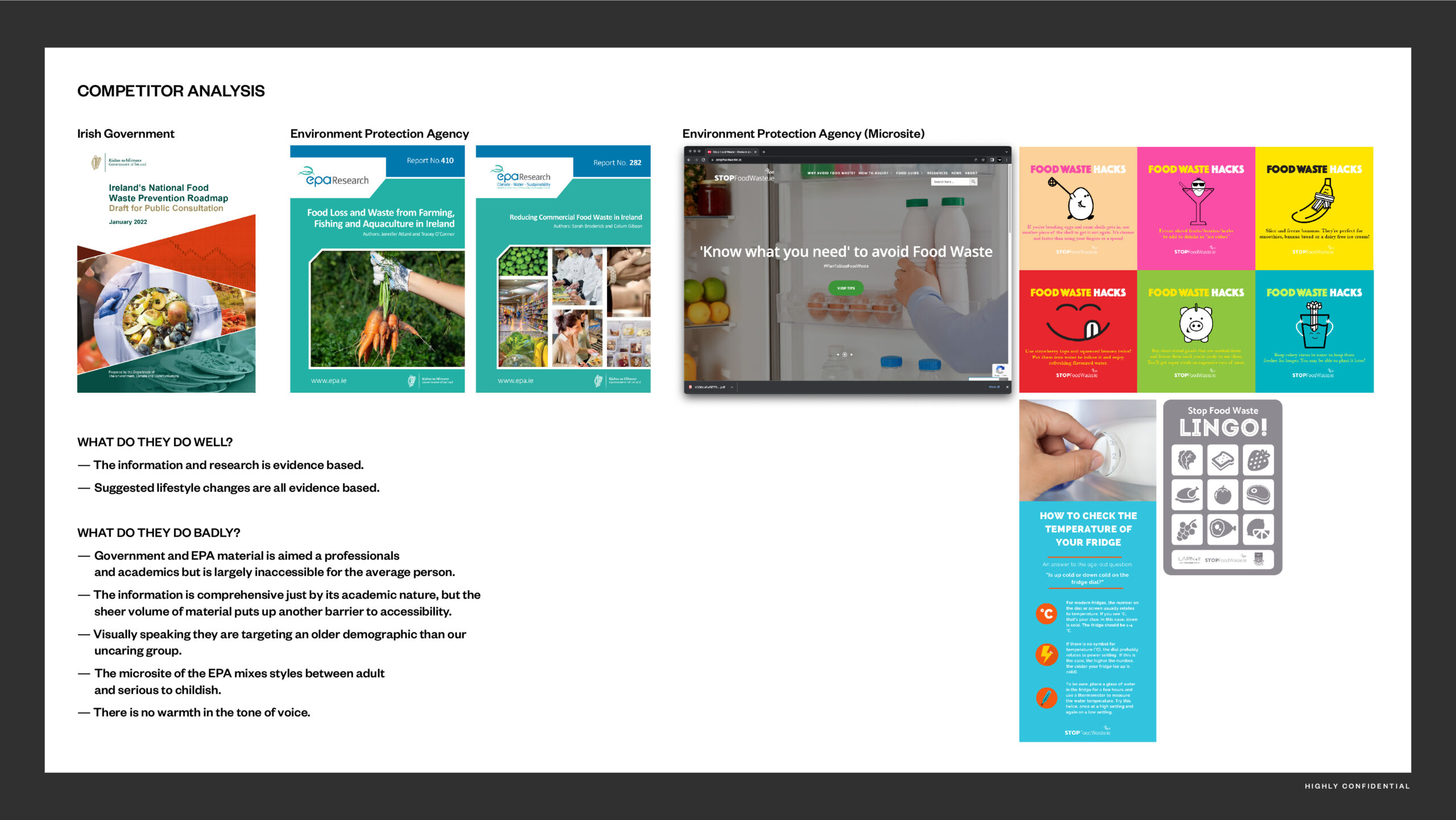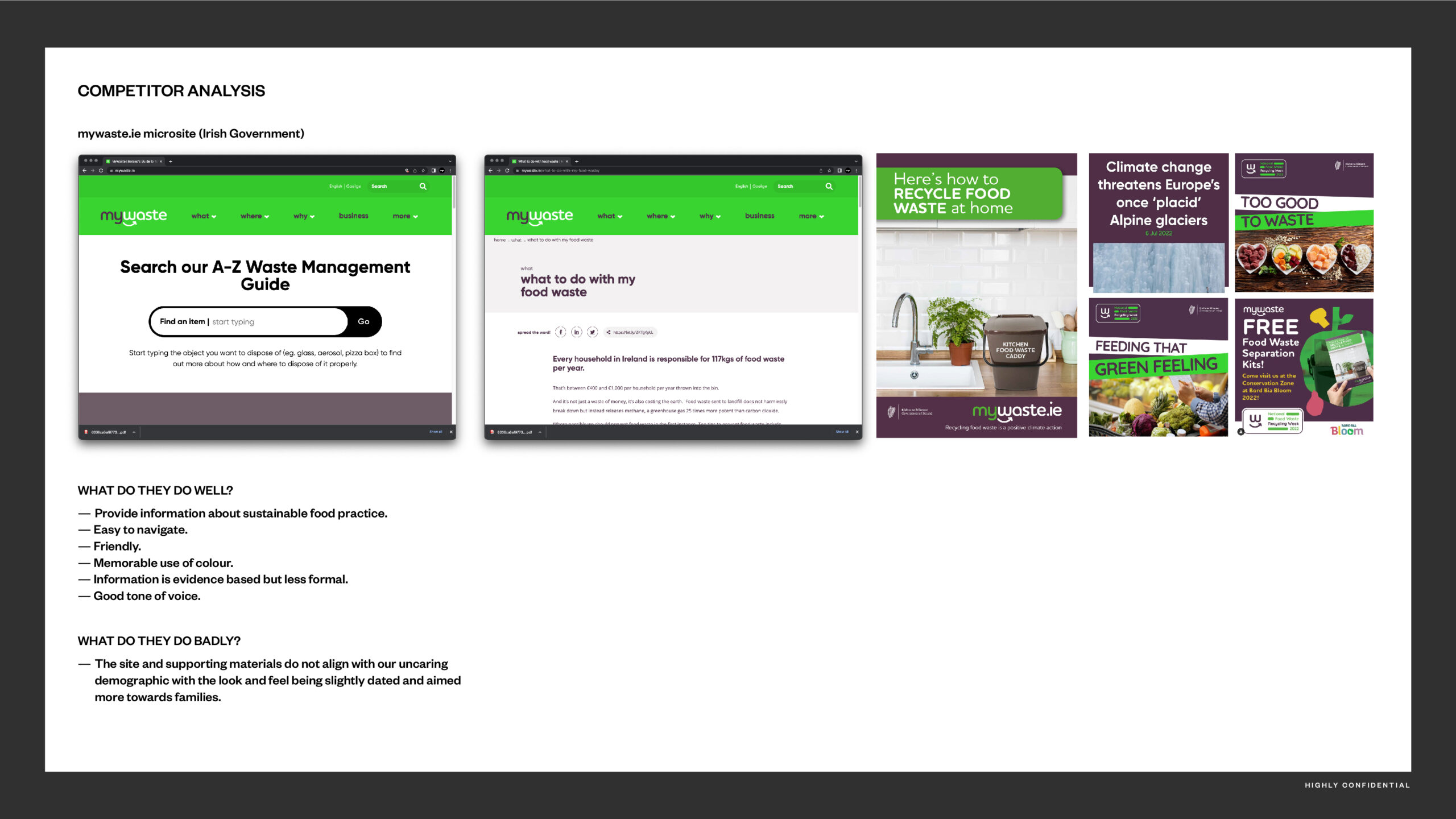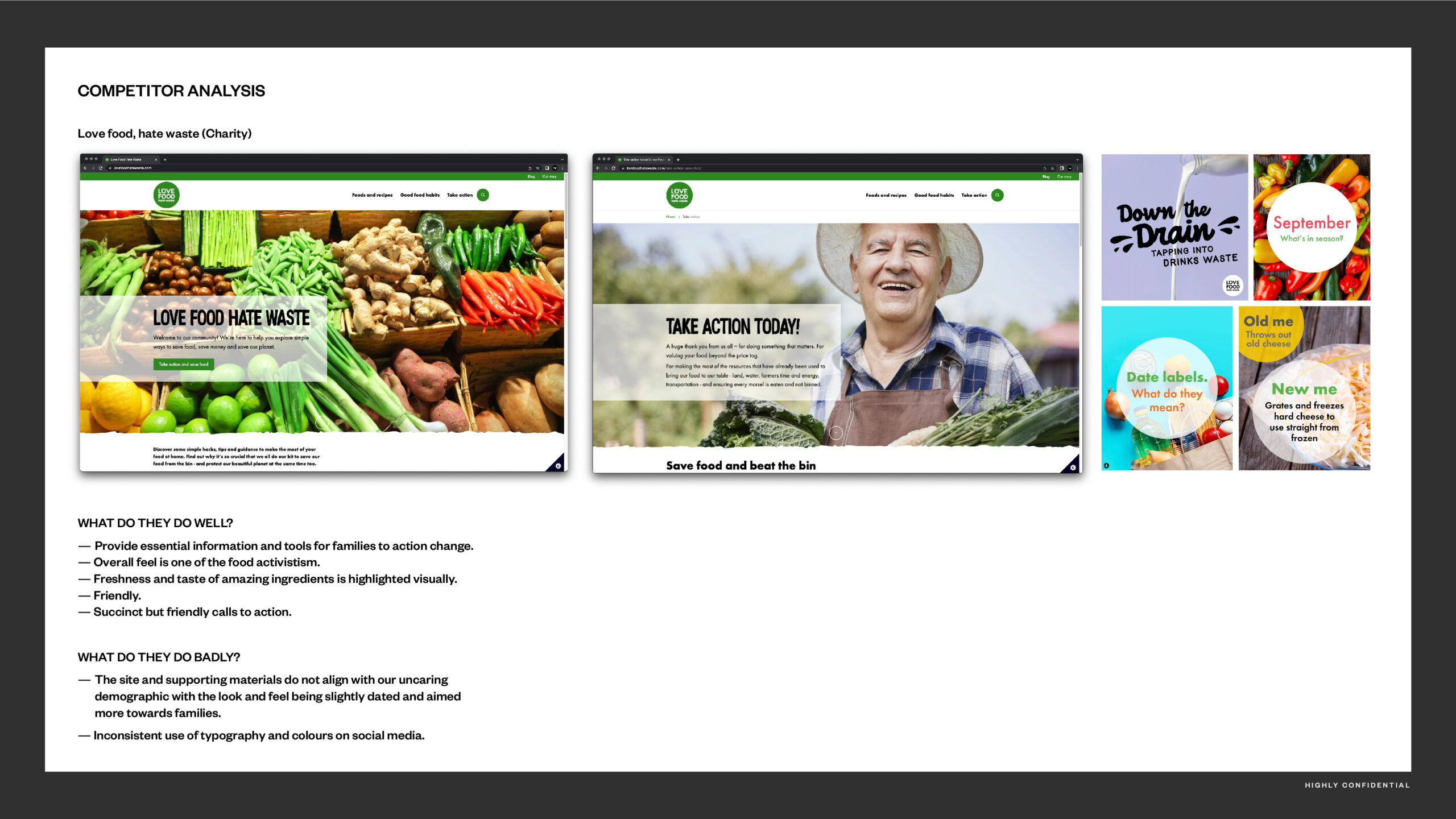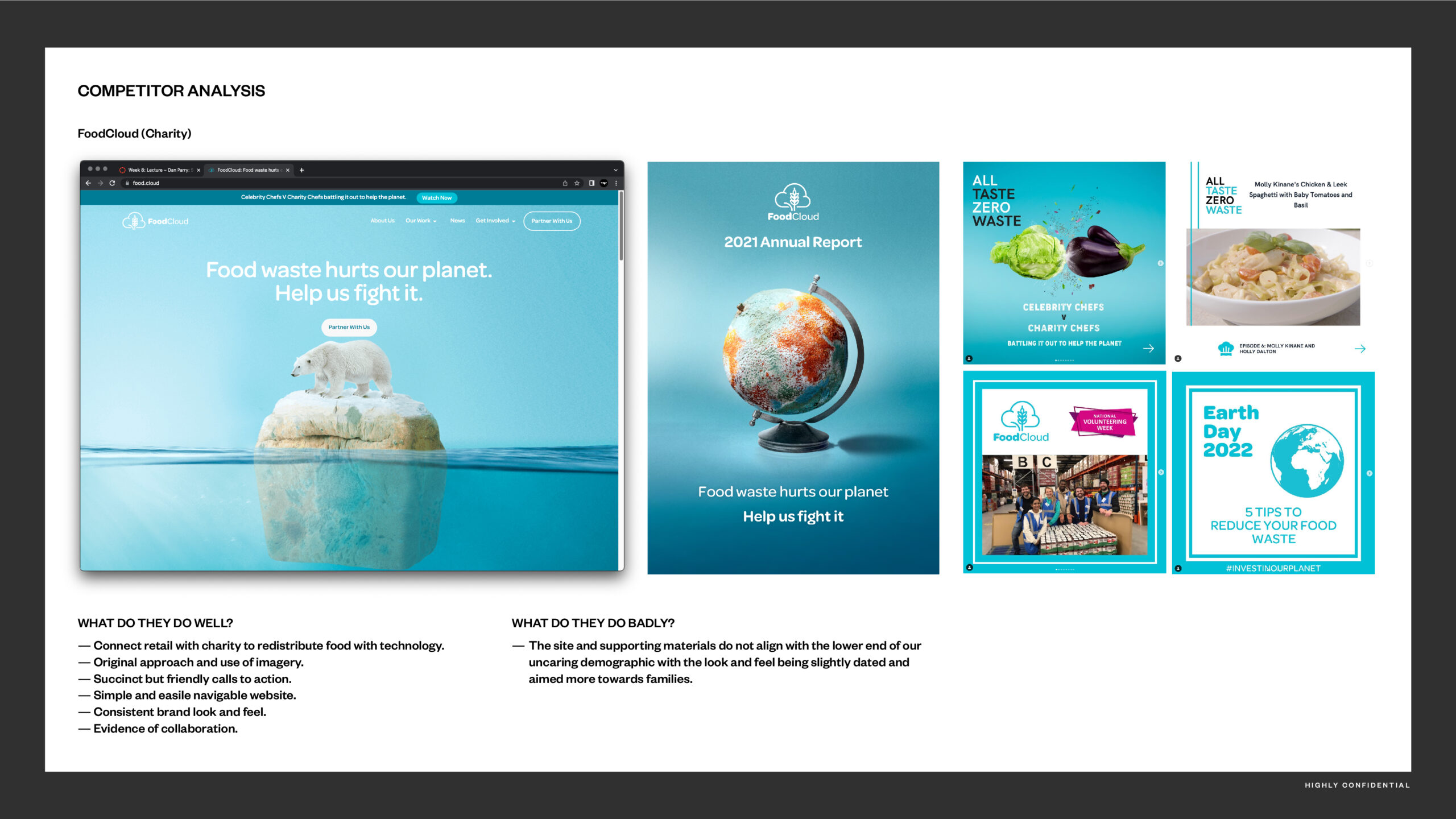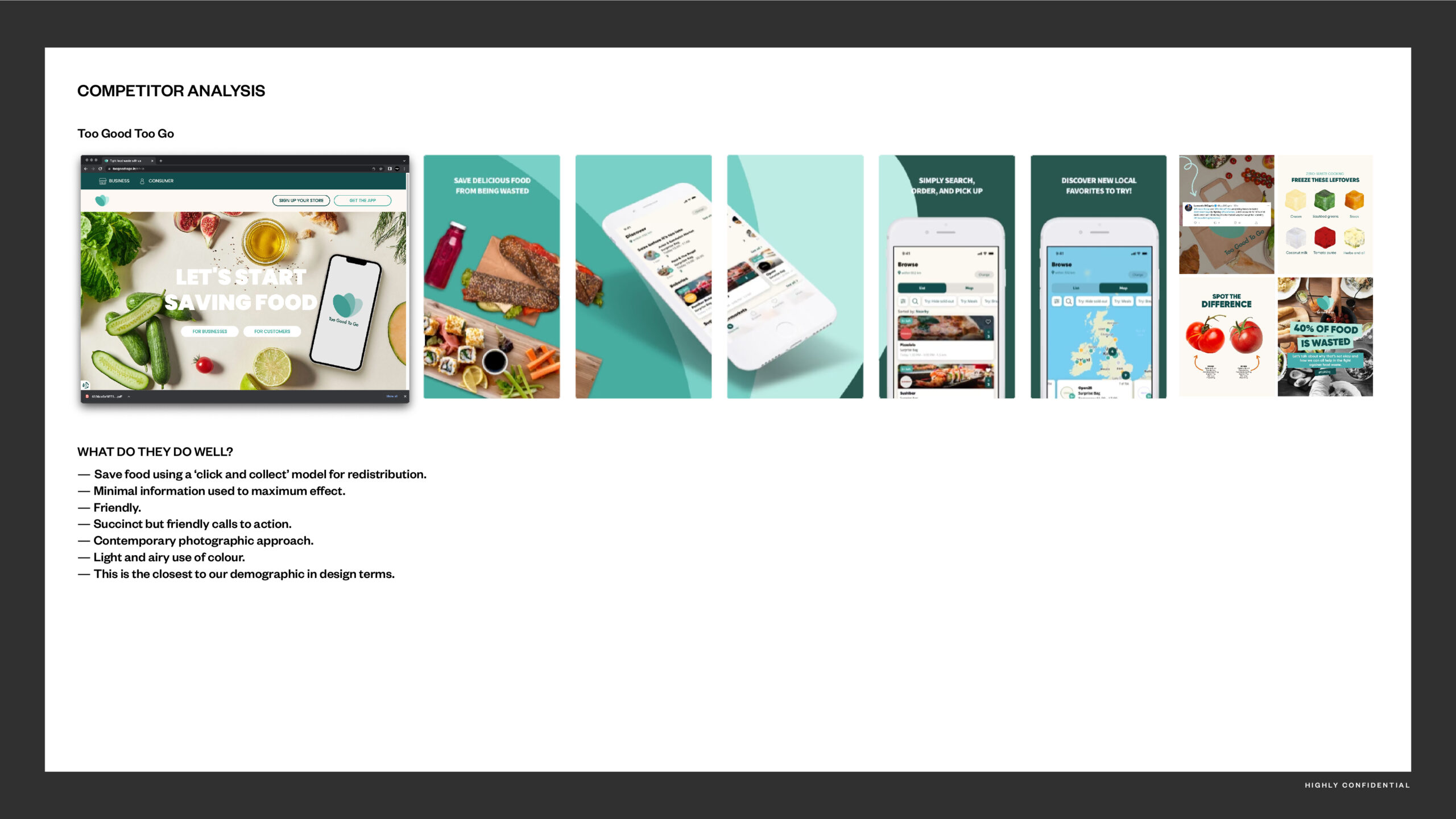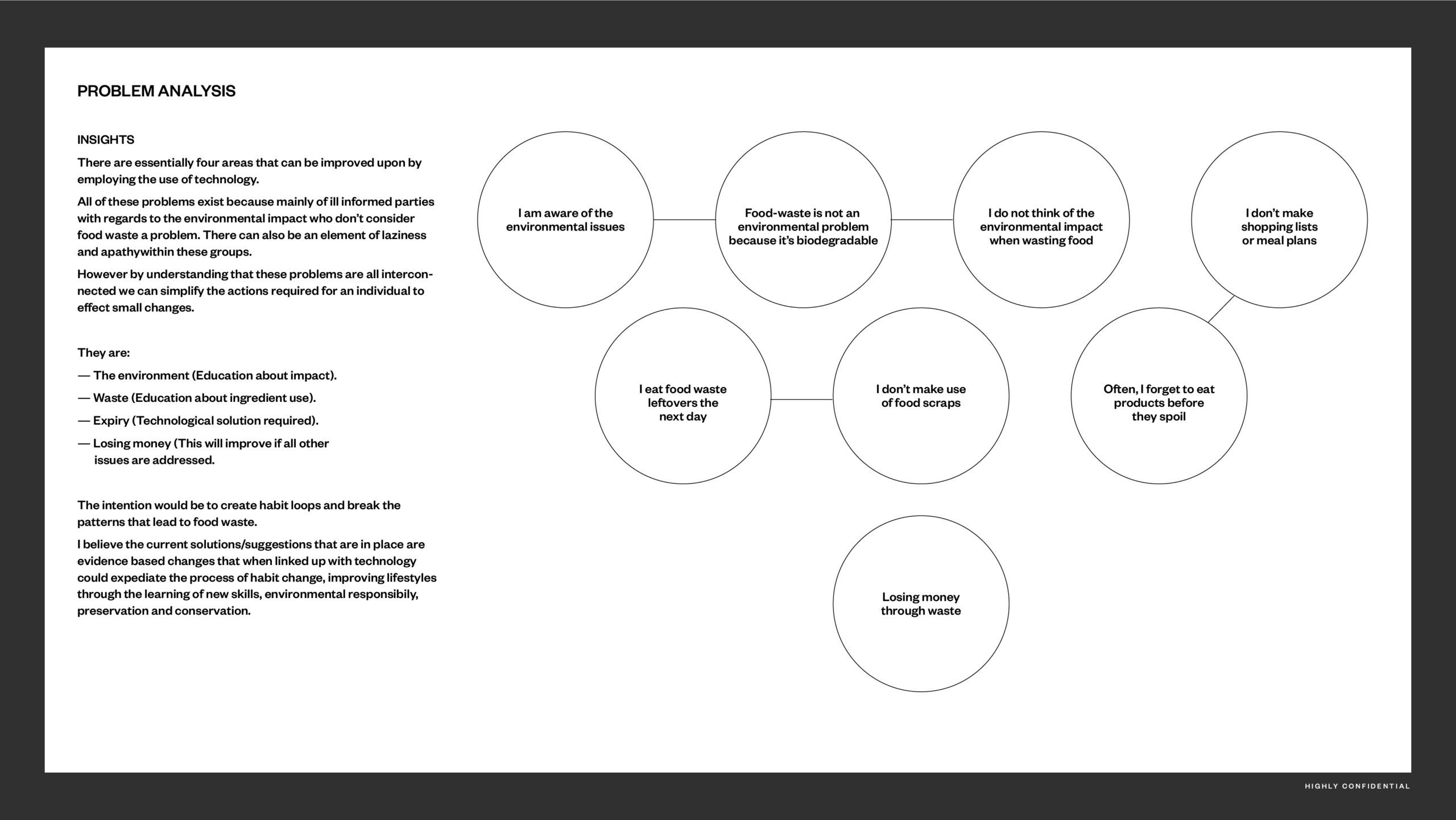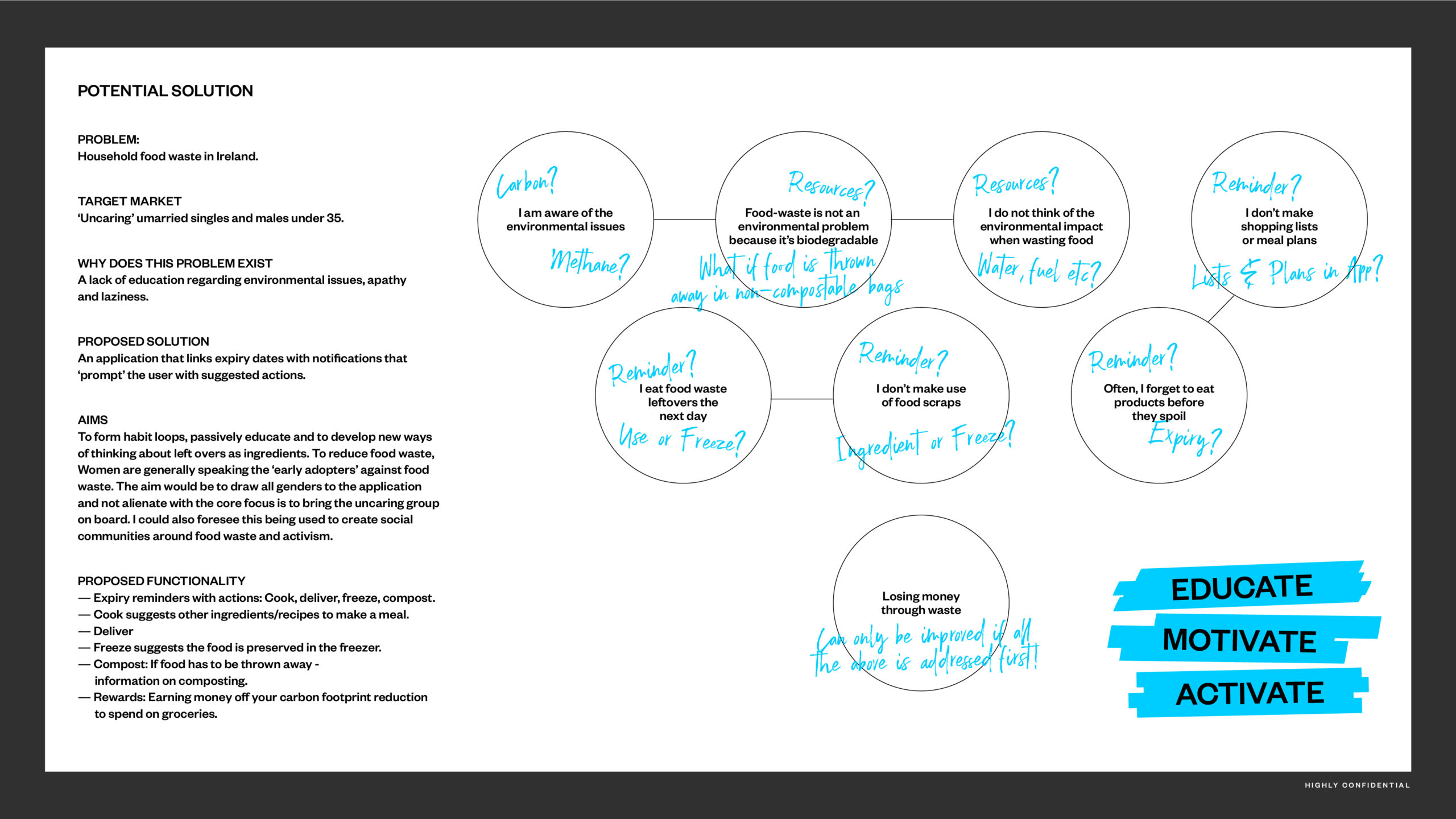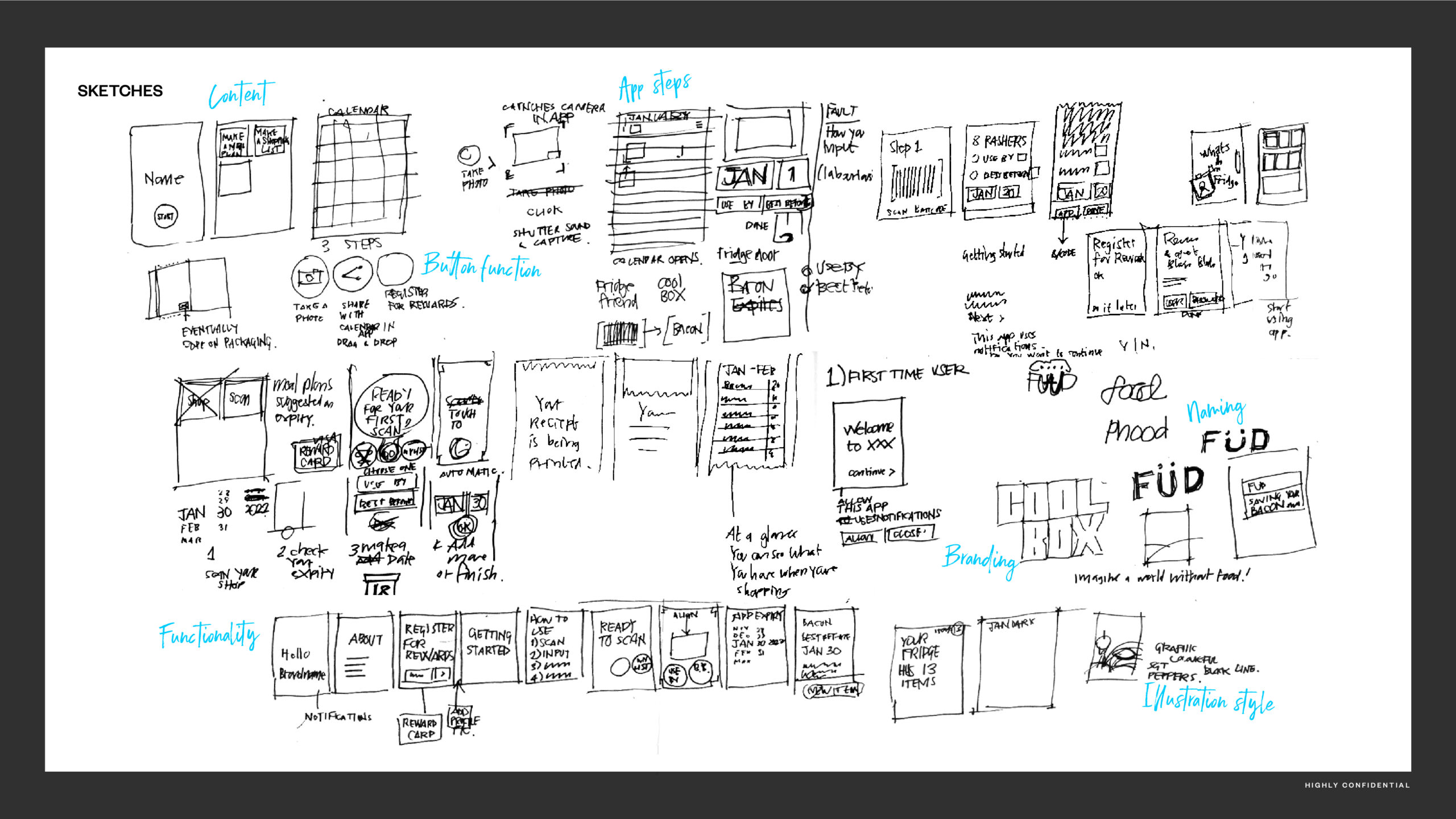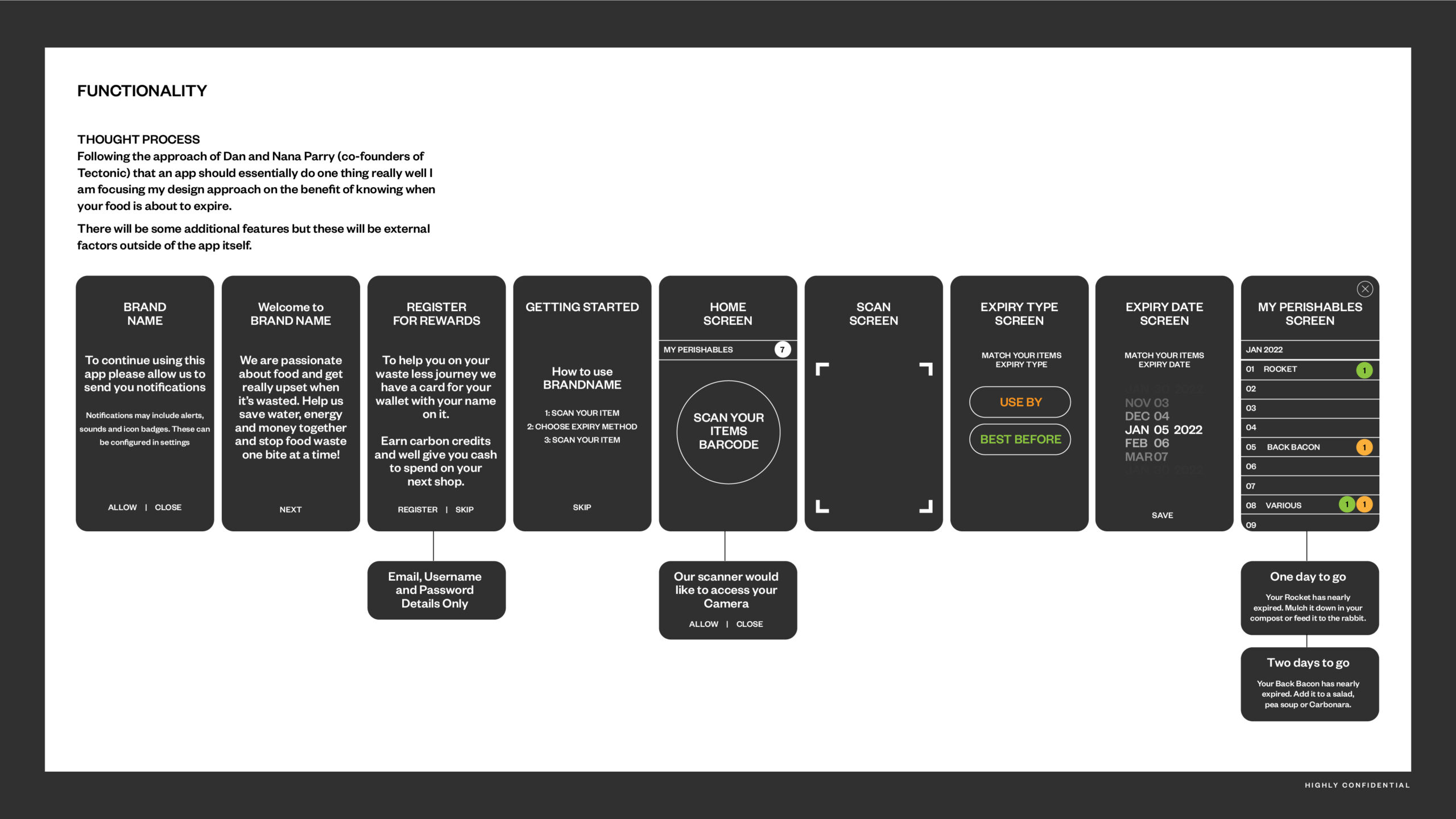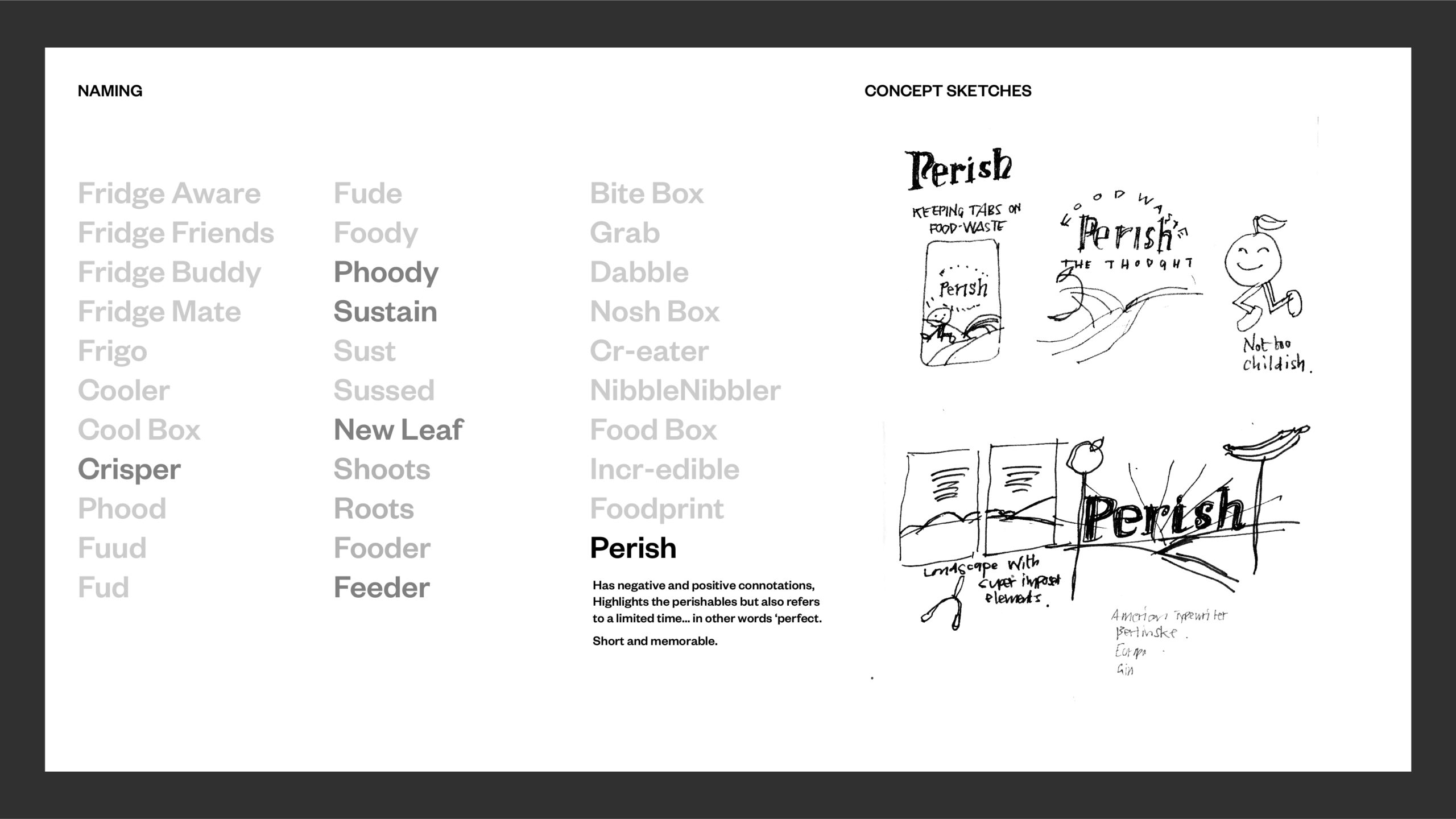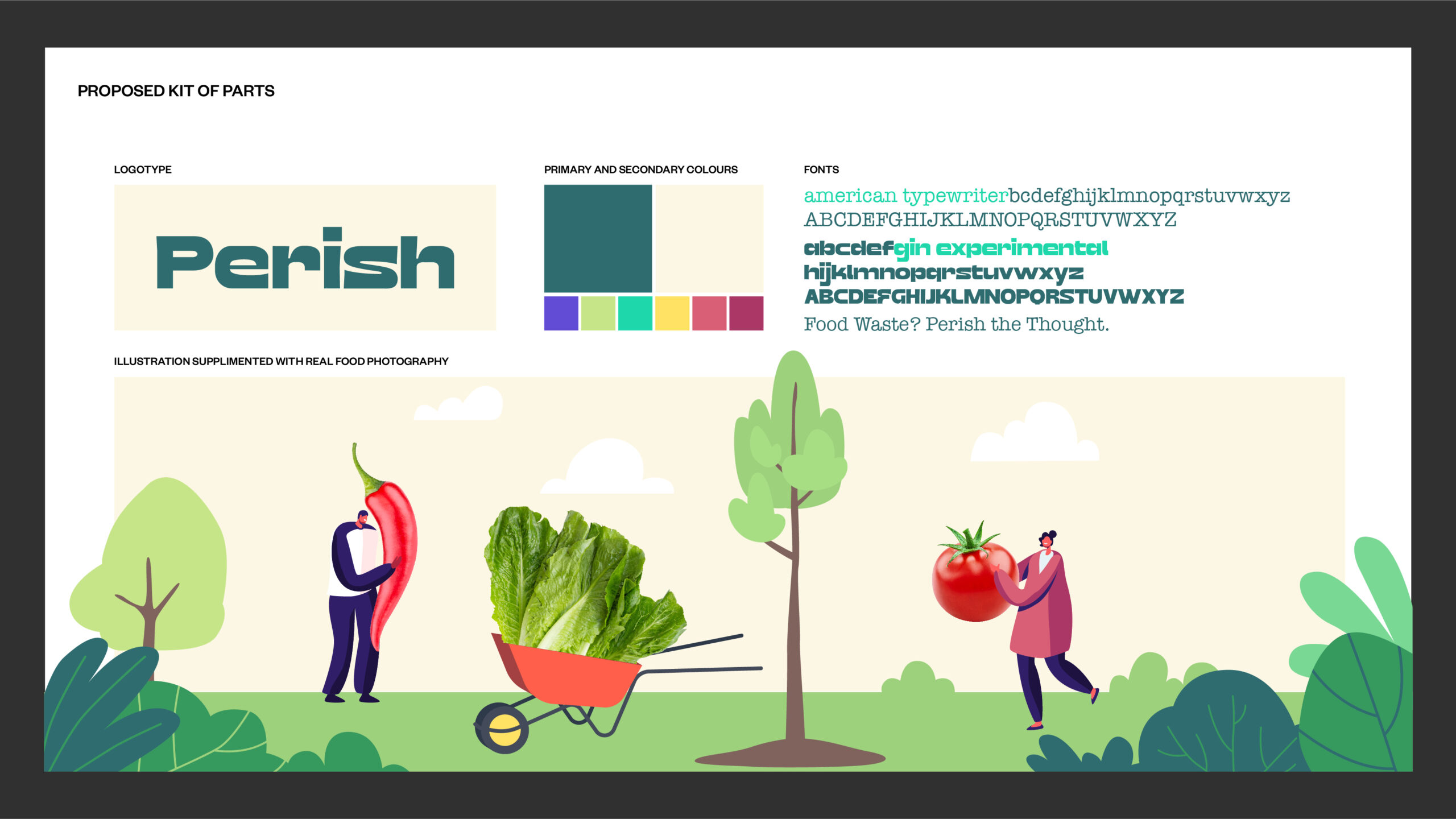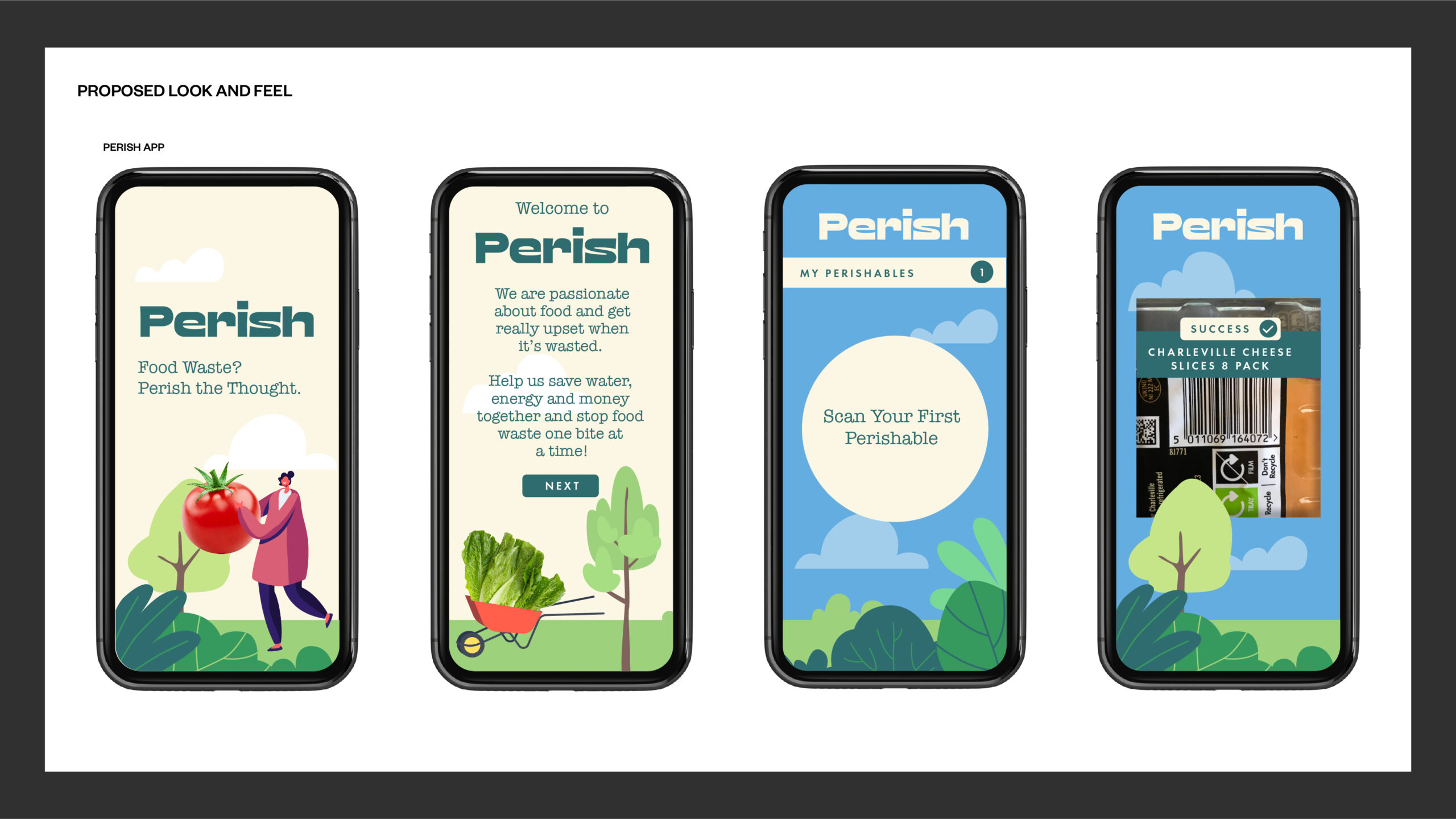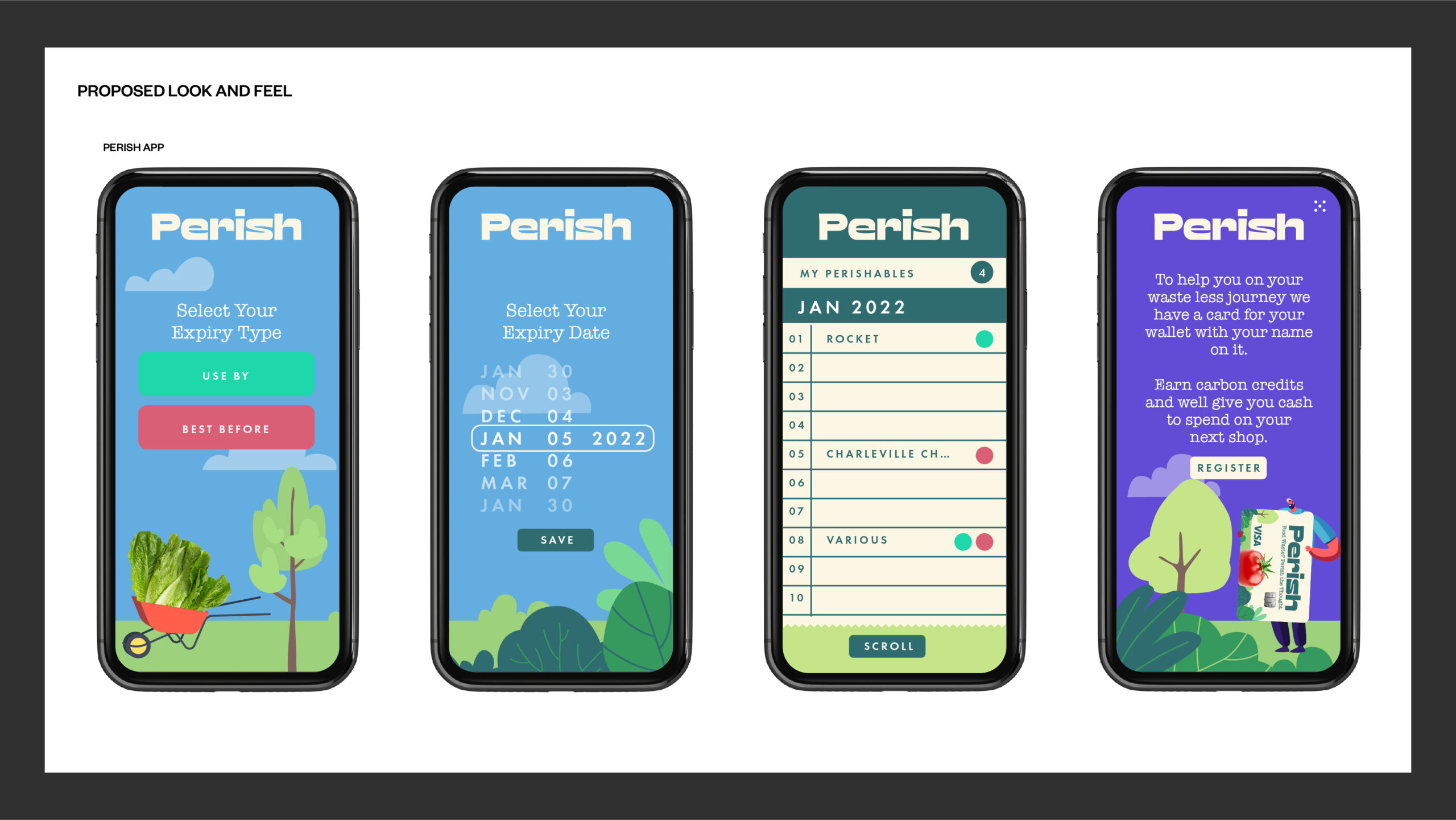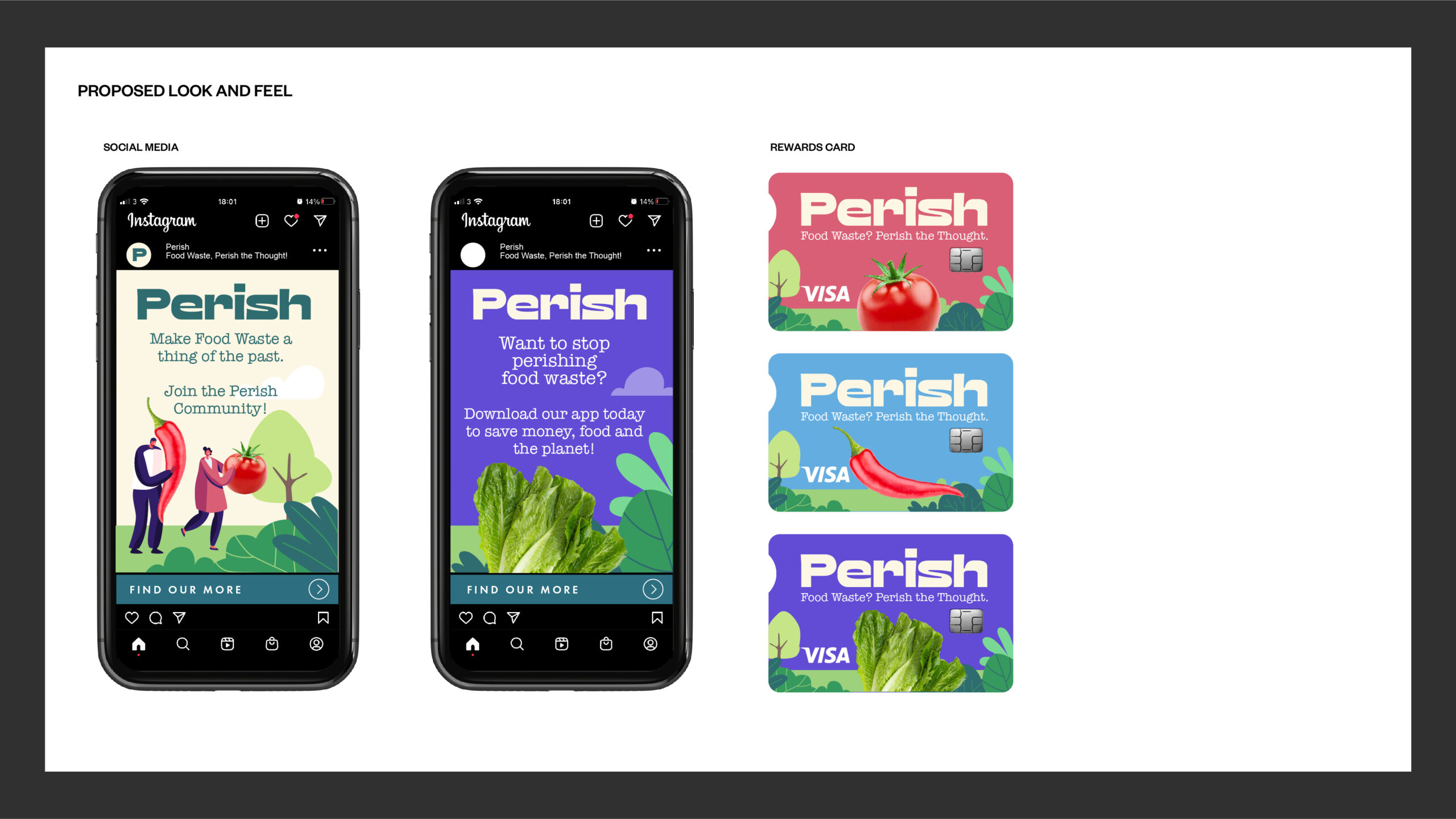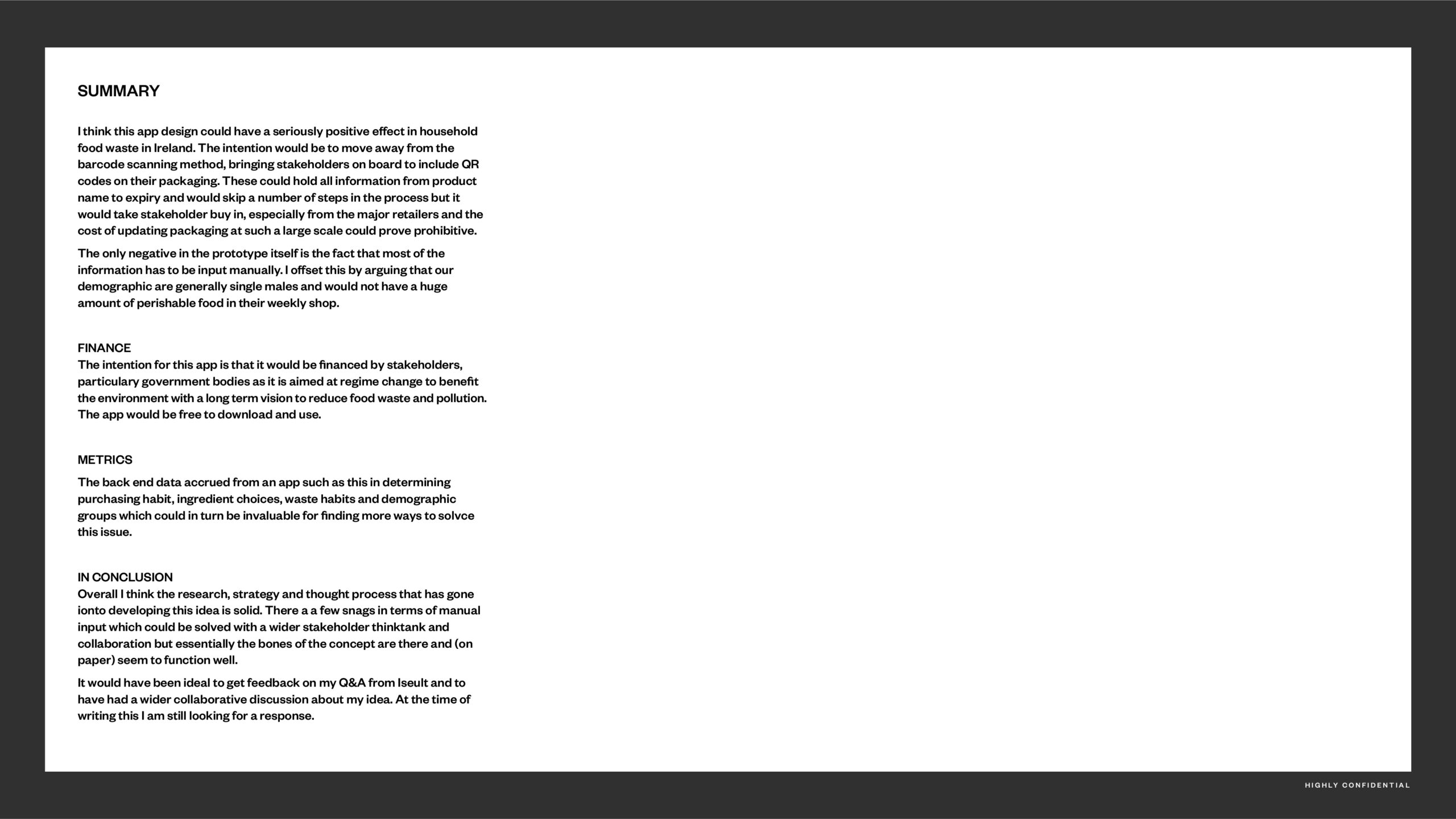Research (Edited):
The Problem
Household Food Waste
Research
Food waste is a global problem that has environmental, social and economic consequences (1). If food waste was a country, it would be the world’s third-biggest emitter of greenhouse gasses after the US and China (4). When it ends up in landfill it releases methane, a greenhouse gas that is more harmful than carbon dioxide (8). Food waste is also deeply unethical – so much food is thrown away while so many people can’t afford to eat (2).
Statistics:
25% Of food produced globally is wasted every year (1).
766,000 tonnes: Ireland's total food waste in 2020 including processing and manufacturing (1+2).
250,000 tonnes of food waste per year produced by Irish households (2).
€700 The costing to Irish households per year due to food waste (2).
€60 per month. Amount saved by each household by reducing food waste.
150kg Average Irish household yearly food waste (1).
68% say that food passing its use-by date is the main reason food is thrown out (2).
75% 3 out of 4 conmsumers understand that use-by dates are a deadline (2).
80% of consumers check use-by dates when both shopping for food and preparing meals to ensure food is still safe to eat (2).
10% The number of people who rate themselves as good at keeping track of food in the fridge (2).
10% The addition to global greenhouse gas emissions through food waste (2).
53% of people don’t realise they can freeze food right up to its use-by date (2).
Taken from an online survey of a nationally representative sample of 1,000 adults ages 16+ on attitudes towards food waste and food management behaviours at home. The survey was carried out between 4th and 14th September 2020 by Behaviour & Attitudes Limited, Ireland's largest independent market research company (2).
Why care?
Growing, processing and transporting food all use significant amounts of resources (land, water, energy). Every item of food wasted also carries the environmental weight of those wasted resources as well (2).
Pre-existing solutions
There are many anecdotal tips and suggestions to be found on the 'Stop Food Waste' website such as identifying what you waste, why you waste it and finding smarter ways to manage your food consumption (3). These are designed to promote habit changes in an individual at the point of shopping, storing or cooking their food. They also provide tools and resources for planning ahead which are downloadable to print offline.
While these suggestions are well meant, is there any data to suggest that they have been enacted? Would consumers print off and follow the given tips? How do you find and follow the top 5 things to enact positive change to your food consumption lifestyle? How much footfall does a site like this site receive and how it is found?.
In truth, I feel like I should have heard of this site before through media and it iOS disappointing that this is the first time I have discovered it exists.
Some of the suggestions were as follows (with additions from the Citizen's Advice Bureau):
— Find out what food you waste and why (3).
— Identify smarter ways to manage your food (3).
— Make a meal plan (3).
— Check the recipes of meals you plan to make. Your shopping list should only have items on it that you will need and use (8).
— Take a photo of the contents of your fridge to remind you (8).
— Check your stocks before you go shopping (8).
— Write a shopping list (3).
— Stick to the list as much as possible and avoid impulse buying (8).
— Freeze food to extend its shelf life (3).
— Keep an eye on dates and give yourself enough time to eat or freeze food (8).
— Learn the difference between ‘use-by’ and ‘best-before’ date labels on food (8).
— Compost your food waste whenever possible, by using a brown bin service or by composting at home (8).
— Keep up your new food management habits (3).
These are all suggestions which will make a viable, incremental changes; however, they rely upon the habit change and will of the individual.
New approaches
A study by researchers at University College Cork (UCC) found that people who are members of Community Supported Agriculture (CSA) schemes (a membership-based system in which people pay towards production costs and receive food in return) waste less food than people who do their main food shopping at supermarkets (5). Essentially, how you shop and where you shop has a big impact on the food waste you generate (6).
The researchers found that organised shoppers, who write shopping lists, meal plans, stock-check their cupboards, and control their budgets, tend to have less food waste. Unfortunately, many shoppers are disorganised and usually shop based on their mood and become tempted by special offers or impulse purchases. In contrast, online food shoppers, using websites or apps shopped in a more structured way with less opportunity to impulse buy and so less food was wasted (6). The study also found that people who are members of Community Supported Agriculture (CSA) schemes (a membership-based system in which people pay towards production costs and receive food in return) waste less food than people who do their main food shopping at supermarkets (5). Having direct access to farmers or local producers meant that there wasn't any packaging to deal with. This made consumers put a higher value on these goods so they were often more resourceful when it came to using them up (6). Many consumers who shop at large supermarket chains reported being frustrated with the level of plastic packaging, particularly in the fruit and vegetable category (6).
The researchers had a sneaky peek inside people’s homes. They looked inside their cupboards, took photographs of their bins and they chatted to consumers about their food purchases and shared their frustrations and challenges around sustainability (5). There were efforts made to save leftovers, or to preserve some produce in the fridge or freezer, but more often than not the fridge and freezer became, a ‘coffin of decay’ (6).
Some suggestions for retailers came out of the report:
— Supermarkets could highlight and promote seasonal products and suggest meal concepts around local seasonal vegetables.
— Supermarkets could give weekly tips on how to use something differently or how to extend the shelf life of perishable foods.
— Supermarkets could give people the opportunity to buy fresh fruit and vegetables loose to allow customers to control the amount they buy.
— Supermarkets could train more staff to become sustainability ambassadors.
— Supermarkets could encourage interaction between producers and chefs via pop-up stands demonstrating and sharing recipes and preservation techniques for local, seasonal produce.
— Supermarkets could offer customers who purchase €10 worth of local and seasonal fruit and vegetables €1-off vouchers for preservation aids such as food processors or dehydrators/dryers.(5)
One of the key issues when focusing on seasonal produce (where supermarkets are concerned) is that of fast food. The availability of what you want, when you want it has driven us away from sustainable farming and the seasonal to food 24/7, 365 days a year. In an ideal world we should, and hopefully will return to natural practice but as it stands in 2022 this will take enormous effort on the part of supply chains and retailers, as well as a re-education process that the consumer can understand. The conversation "why can't I get this now' will have to be had and answered through education. This, I think is a long term goal rather than a reality at this time.
A separate report by Goodbody's, a full service financial services firm, suggested the following (UN Food Waste Index Report 2021):
— A heightened focus on education, particularly within the household around labelling and refrigeration was required.
— Investment and innovation in food technologies, could play a crucial role in reducing food waste. (7)
In the venture capital market, food-tech that reduces food waste or improves food traceability or kitchen/manufacturing efficiencies is currently worth $61.9bn – and that’s expected to reach $85bn by 2026, with deal activity almost doubling in 2021. And so, the potential for start-ups and investments to support enhanced technology offerings across the food supply chain will help to deliver a more sustainable food system for people and the planet.
Foodcloud
Think food, technology and business and Iseult Ward (chief executive and co-founder) should surely come to mind. She developed FoodCloud into a business with Trinity's Launchbox Programme and it was awarded a programme place at the National Digital Research Centre and from the Arthur Guinness Fund. Since its launch, Foodcloud has helped reduce food waste by using technology to connect business to charity and community groups who may need it (5).
Insights from Irish Food waste eco experts:
"Breaking the thought process that people are used to and looking at food in another way, treating them as an ingredient rather than waste is the beginning of change." (Grainne Carberry/Foodspace).
"Buy what you need and eat what you buy. Making sure that you’ve made the most out of your ingredients from your supermarket shop is a really easy way of reducing food waste and it can be fun to get creative in the kitchen! Embrace the chance to explore new ways of working with ingredients. (Jamie Crummie/Too good to go)."
"It’s great to meal plan for the week while leaving a day or two blank in between to make something exciting out of the left-overs." (Maurice McGeehan/No Waste Chef) (9).
I personally believe that this approach of thinking about food 'differently' is the key to reducing food waste. If you can connect the dots between what you have left in the food cupboard to a few extra ingredients to make amazing meals then your habits will naturally change in a sustainable way that you will hardly notice. It happens to all of us that we have times that we don't feel like cooking and a take-away is ordered or a restaurant is booked. In this regard knowing what is in your fridge and if it can be frozen to extend its shelf-life is also important. Understanding that 'Use-by' is a deadline and 'best before' is a recommendation is also key. When is my food past its sell by date?, can I still eat it?, and can it be frozen days after purchase but before its expiry. I think many of these problems can be solved with technology.
We use technology to buy food online, follow recipes and watch shows about food. We also use tech in all other aspects of our lives - for communication, appointments, reminders, banking, travel, gaming, fashion etc. We are used to apps and, whilst sometimes annoying, prompts to call us into action such as an alarm clock going off or a meeting reminder. I believe these small intrusions can help us on our journey towards wasting less food. Through further research I will demonstrate this and map the process.
Inspired by Dan and Nana Parry's process (co-founders of Tectonic) I intend to apply their methods, thinking and working to my own journey of discovery.
1) Retrieved from: https://www.epa.ie/our-services/monitoring--assessment/waste/national-waste-statistics/.
2) Retrieved from: https://www.epa.ie/news-releases/news-releases-2020/food-waste-is-robbing-you-blind-freeze-your-food-before-its-use-by-date-to-save-money-and-reduce-global-greenhouse-emissions-.php.
3) Retrieved from: https://stopfoodwaste.ie/resource/whyavoidfoodwaste
4) Retrieved from: https://www.goodbody.ie/for-corporates-and-institutions/investment-banking/latest-news/latest-news/2022/05/18/goodbody-research-report-irish-consumers-could-save-60-a-month-by-reducing-food-waste.
5) Retrieved from: https://www.irishtimes.com/life-and-style/food-and-drink/what-irish-households-can-do-to-waste-less-food-1.4737454.
6) Retrieved from: https://www.ucc.ie/en/news/how-and-where-you-shop-has-a-big-impact-on-food-waste-study-reveals-.html.
7) Retrieved from: https://www.goodbody.ie/for-corporates-and-institutions/investment-banking/latest-news/latest-news/2022/05/18/goodbody-research-report-irish-consumers-could-save-60-a-month-by-reducing-food-waste
8) Retrieved from: https://www.citizensinformation.ie/en/environment/waste_and_recycling/reducing_waste.html.
9) Retrieved from: https://toogoodtogo.ie/en-ie/blog/food-waste-tips-eco-experts.
...


